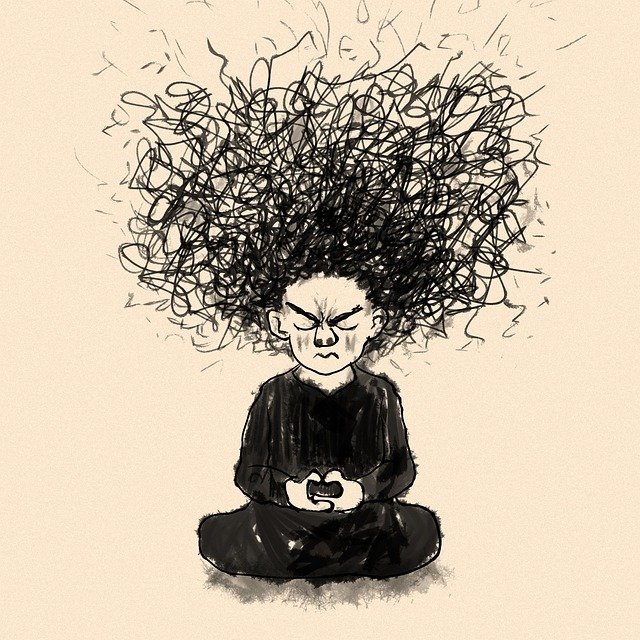 Submitted by Dr. Dave on
Submitted by Dr. Dave on

Image by 愚木混株 Cdd20 from http://Pixabay.com
Middle age gets an undeserved reputation for crises. Some blame the stars, pointing to a rough Saturn Return painting the astrological skies. But, realistically, the rash actions that we associate with a midlife crisis can happen at any and every phase in life. Once you recognize that strife and struggle between two opposing outlooks can cause a spiritual and emotional crisis, you'll see that many stages of life have a similar challenge. I'd like to introduce you to the many crises of life so that you won't feel so alone.
Trust Versus Mistrust
Psychologist Erik Erikson wrote a theory about psychological development that proposed that we are all supposed to go through emotional crises in life. We intuitively know that this is true, since popular culture widely accepts the idea of teenage identity crisis and a mid-life crisis during adulthood. Erikson noted, however, that some crises come about out of order and are triggered by something big happening later in life, just like what’s happening to you now. So, for example, if you skipped the identity crisis in your teenage years, you might have it later in life. If you find out that you have a life-limiting illness, you might go through a crisis that you weren't due for until old age. Over the next few paragraphs, we'll explore the Eriksonian crises and how you can process them now, if necessary.
Consider the crisis of trust versus mistrust. At some point in your life, you hopefully learned to trust people, such as a caregiver when you were an infant. If you never learned to trust, you may find your crisis is forcing you to place your trust in a professional, the medical industry, or the judicial system. Write in your journal how you feel about the people in whom you should place your trust, and how you can work through this crisis, if applicable. Explore areas of trust and mistrust in your life, seeking to find a balance of reasonable trust.
Autonomy Versus Shame and Doubt
Very young children insist, "I can do it myself" when attempting daily tasks, with varying degrees of success. If we were supported by loving parents who also encouraged a healthy degree of independence when we were toddlers, chances are that we were able to develop a similarly healthy autonomy. If, however, we were smothered or neglected or somehow skipped this stage, a traumatic event can leave us feeling hopelessly incompetent.
Remember that one of the few emotions that you should try to actively prevent yourself from feeling is shame. If you are feeling shame connected with your level of dependence on others or isolation from those who can help you, this crisis is one that you should explore and resolve. Reach for your inner source of competence and power, and tell yourself that mistakes along the way to independence are okay. If there are people in your life who do not support any degree of independence on your part, talk with them and set up some boundaries that help you find more freedom. Write in your journal about any shame you feel connected to your independence or lack thereof.
Initiative Versus Guilt
Preschool-age children move into a crisis of making their own independent choices and learning to live with their own responsibility for outcomes. You can probably pick out the people in your life who never fully resolved this conflict because they have a hard time taking responsibility for their own mistakes. Always have compassion for the people who experience a sensation of guilt that feels too great to bear. Your current situation might cause you to spiral back into the preschool age thought that you might have somehow caused misfortunes that are no fault of your own.
If you are still feeling a sense of guilt over the course of your life, you might just be living through another iteration of the initiative versus guilt crisis. Look at your situation with a reasonable eye, perhaps with the assistance of your most trusted loved ones or a qualified professional. If there is something that you can reasonably do to mitigate your current situation, by all means you should take the initiative to try. However, it does no good to attempt to blame yourself for random happenstance or to continue to beat yourself up over past choices. Write in your journal about any past decisions related to your condition that make you feel guilty, then write down anything that is still your responsibility to improve.
Industry Versus Inferiority
School-aged children move through a crisis of industry versus inferiority in which they attempt to work harder on jobs at school and, if they are unable to complete that work for whatever reason, they may spiral into a sense of never being able to complete the work. I can tell you that my six-year-old son is going through this phase right now, and he often quits his chores or schoolwork before he's given them an honest effort. Unfortunately, traumatized adults can feel echoes of this early life crisis when some calamity makes it quite impossible to honour their obligations at work or at school.
You'll know if you're going through the industry versus isolation crisis all over again if you know for a fact that nobody would blame you for doing less work and yet you find that you're inwardly calling yourself lazy or inferior. Explore in your journal any work that you are missing because you miss being productive. Brainstorm some new ways that you can feel just as industrious without putting your health and healing at risk.
Identity Versus Role Confusion
Ah, now we've landed upon the cliche identity crisis experienced by teenagers around the world. While we might remember with fondness the silly outfits and fads that we tried in order to experience new roles in our social circles, the identity crisis thrust upon us by trauma and tragedy is terrifying and invalidating. Are you the type of person you are because of the deeds that you do? If the answer to that question is yes, you'll struggle once you can't do the same activities anymore. You will be thrust into the very real conundrum of trying to figure out what aspects of your personality are stable attributes, and to what inner virtues you can cling when everything else is stripped away.
Sometimes other people can be more perceptive when you are confused about yourself. Ask people closest to you to name three adjectives that describe you, and what they thought about you when they first met you. You will likely notice a pattern about what people say about you, regardless of what point in your life they met you. Once you have a list of a few stable attributes people have noticed before and after whatever events have shaped you now, meditate on those personality traits and how to best express them in the world. Quiz your loved ones: What are three words that describe you? What is the first thing that he or she noticed about you when you met?
Intimacy Versus Isolation
As young adulthood matures into midlife, many people turn to companionship and the search for a soulmate. Couplehood is not the ultimate achievement in life, and there are plenty of people who are joyfully single. However, most people continue to seek intimacy (if not in a romantic relationship, tha=en in their friendships and family interactions). If your problems have caused a best friend or even a spouse to take their leave from your life, you will find yourself spiraling into a crisis of feeling isolated by your issues. It may feel like nobody in your life understands what you are going through, and such feelings are reinforced by well-meaning attempts by others to draw parallels between your personal tragedy and what may seem to be relatively minor troubles of their own.
My experience with isolation has been a rough one, since I lost a spouse and three of my closest friends with whom I connected every day. I can confirm that, if you lose enough people who are close to you, it can feel like there can be nobody else, because those people you lost fill your entire social horizon. There can be others with whom you can connect on an emotionally intimate level, but such connections cannot happen overnight. You'll need time, perhaps months, to witness whether you can trust your deepest thoughts with somebody who is shifting from being an acquaintance to a friend, or from a friend to a good friend. If you witness signs that somebody is a gossiper or overreacts to anything more than small talk, it is better to be lonely a bit longer while waiting for the right connection to develop.
Evaluate the friends that are currently in your life. Have some of them transitioned from being an acquaintance to being a friend? Of your current friends, are there any who could potentially be a good friend? Are your potential good friends trustworthy with your heart? Invite a friend to tea and see if you can talk about what is important in your lives.
Generativity Versus Stagnation
The midlife crisis may be more technically described as one of generativity versus stagnation, meaning contributions to others and future generations or feeling stuck and self-absorbed. Any traumatic event requires so much self-care that one can easily feel selfish. There is so much navel-gazing to do in pursuit of finding one's true purpose in life in the face of limited.
In your journal, I'd like you to write about what pursuits in your life, regardless of whether you still do them, have been a fulfilling way for you to contribute to your community, the planet, or to future generations. For some people, your interactions at work in one of your jobs may have been a source of generativity. For other people, time spent raising a family or caring for one's elders. Make a list that encompasses the first time you felt fulfilled with your contributions to the last time. Make note of anything that each of your pursuits had in common and any barriers you had to success.
Ego Integrity Versus Despair
The last Eriksonian crisis point reached in life is that of old age, ego integrity versus despair. Ego integrity is the state of being satisfied with a life well-lived, having come to terms with the choices you've made and feeling like you've generally done the best you can with what you have. Despair is what Erikson decided was the emotion in play when elderly people became obsessed with the past. Ideally, you would only encounter this crisis during your golden years, but if you're facing life-limiting illness or if you're just an overachiever you might end up puzzling over this one at a younger age.
Everyone has made mistakes in life, and some of your own mistakes may loom large during a time when it feels right to consider your life in review. Practice self-forgiveness. Some people pray for forgiveness from the divine, but if you cannot forgive yourself, your sense of crisis may remain. Take time in meditation today to talk to your higher self. Instead of begging yourself for forgiveness, try to inhabit the perspective of your higher self to become your own loving parent and forgive yourself. During any past mistakes that still haunt you, see yourself as somebody's wayward child. See the youth and immaturity in past choices and wrap yourself in love, comfort, and forgiveness. Forgive yourself for past mistakes in the same way that a loving and divine parent would forgive.
Alexandra Chauran
Author of Getting Through It: Reclaim and Rebuild Your Life After Adversity, Change, or Trauma
https://www.llewellyn.com/journal/article/2866
Copyright © 12-21-2020 - Llewellyn Worldwide, Ltd.
- 439 reads